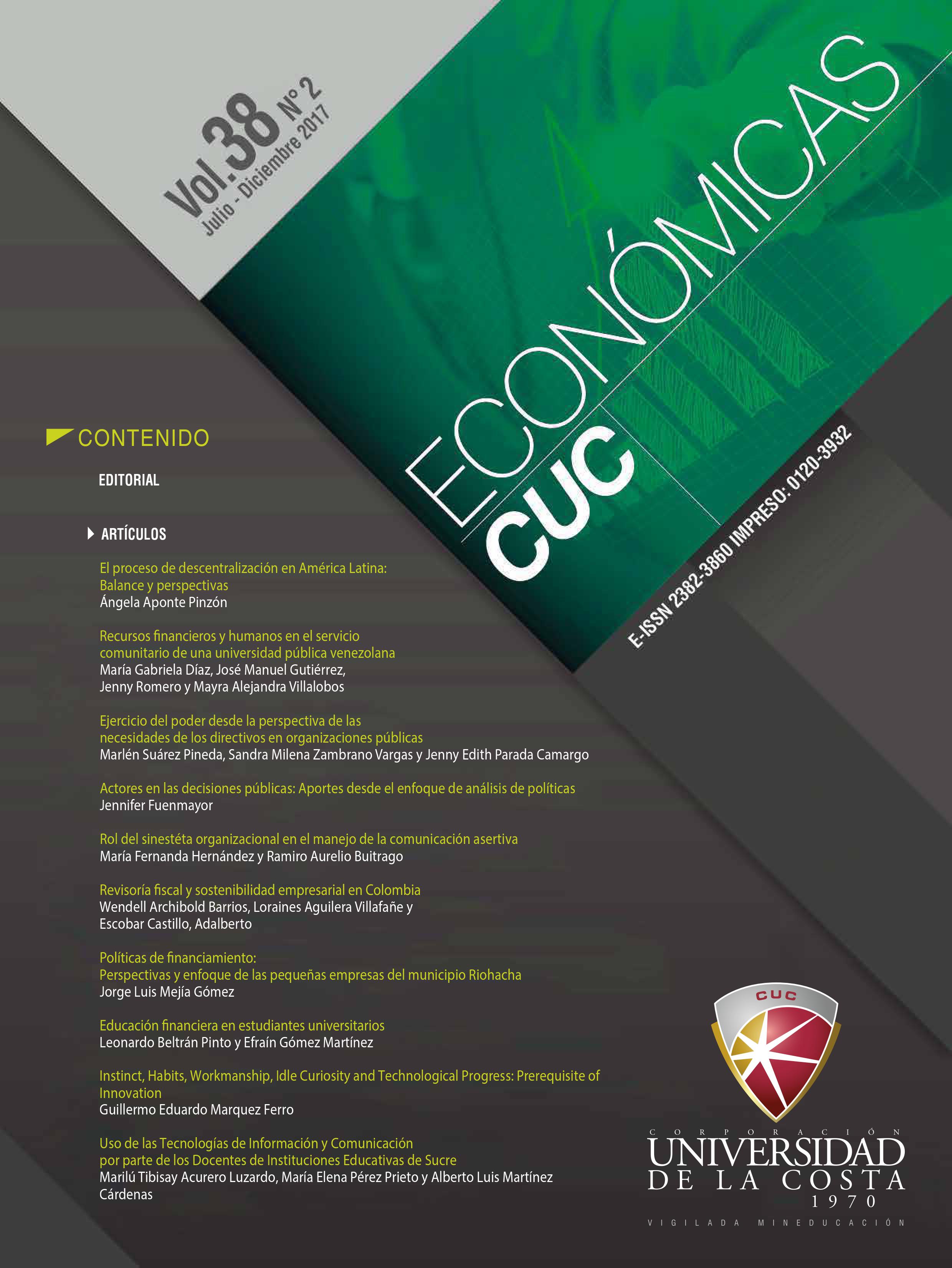“Instinct, Habits, Workmanship, Idle Curiosity and Technological Progress: Prerequisite of Innovation”
DOI:
https://doi.org/10.17981/econcuc.38.2.2017.09Keywords:
Instincts, Habits, Instinct of Workmanship, Idle Curiosity, Economic ProgressAbstract
The present essay pursues to connect the concepts of instinct, habits, instinct of workmanship and idle curiosity, all of them researched by Thorsten Veblen, with the Theory of Economic Progress, from Clarence E. Ayres, both economists considered founding fathers of the Institutionalism in Economics, to aim to the beginning of a definition process for a theoretical framework to support a future doctoral thesis in the Innovation aspects. We believe that the Institutionalism, as an economic thought, represents a solid conceptual framework to deeply explore the development of Innovation
Downloads
References
Ayres, C. E. (1953). The role of Technologyin Economic Theory. In: Papers and Proceedings of the Sixty Fifth Meeting of the American Economic Association, (May. 1953). The Annual American Economic Review, 43(2), 279- 287.
Ayres, C. E. (1943). The significance of Economic Planning. In: Development of collective Enterprise, edited by Seba Eldrigde et al. Lawrence. Kansas: University of Kansas Press.
Cordes, C. (2004). Veblen’s” instinct of Workmanship”, Its Cognitive Foundations, and Some Implications for Economic Theory. Germany: Max-Planck-Institute for Research into Economic Systems.
Epstein, R. C. (1926). Industrial Invention: Heroic, or Systematic? The Quarterly Journal of Economics, 40(2), 232-272.
Hill, L. E. (1997). Clarence Edwin Ayres and John Kenneth Galbraith: from instrumental institutionalism to the new industrial state. International Journal of Social Economics, 24(10), 1094-1102.
Hodgson, G. M. (2006). Instinct and habit before reason: Comparing the views of John Dewey, Friedrich Hayek and Thorsten Veblen. Advances in Austrian Economics, 9. 109-143.
Hodgson, G. M. (2004). The Darwinian Mind of Thorsten Veblen, (Ch. 7): “The evolution of Institutional Economics”. London: Rutledge.
Hodgson, G. M. (2004). The evolution of Clarence. Ayres, (Ch. 16): “The Evolution of Institutional Economics”. London: Rutledge.
McDougall, W. (2015). An introduction to social psychology. London: Psychology Press.
Redmond, W. H. (2003). Innovation, diffusion, and institutional change. Journal of Economic Issues, 37(3), 665-679.
Rutherford, M. (1981). Clarence Ayres and the instrumental theory of value. Journal of Economic Issues, 15(3), 657-673.
Veblen, T. (1898). The instinct of workmanship and the irksomeness of labor. American Journal of Sociology, 4(2), 187-201.
Veblen, T. (1919). The place of Science in Modern Civilization. USA, New York: Viking Press.
Veblen, T. (1908). The instinct of workmanship and the State of the Industrial Arts. London: Rutledge.
Weinel, I., & Crossland, P. D. (1989). The scientific foundations of technological progress. Journal of Economic Issues, 23(3), 795-808.
Downloads
Published
How to Cite
Issue
Section
License
You are free to:
- Share — copy and redistribute the material in any medium or format
- The licensor cannot revoke these freedoms as long as you follow the license terms.
Under the following terms:
- Attribution — You must give appropriate credit , provide a link to the license, and indicate if changes were made . You may do so in any reasonable manner, but not in any way that suggests the licensor endorses you or your use.
- NonCommercial — You may not use the material for commercial purposes .
- NoDerivatives — If you remix, transform, or build upon the material, you may not distribute the modified material.
- No additional restrictions — You may not apply legal terms or technological measures that legally restrict others from doing anything the license permits.


 English
English
 Español (España)
Español (España)














